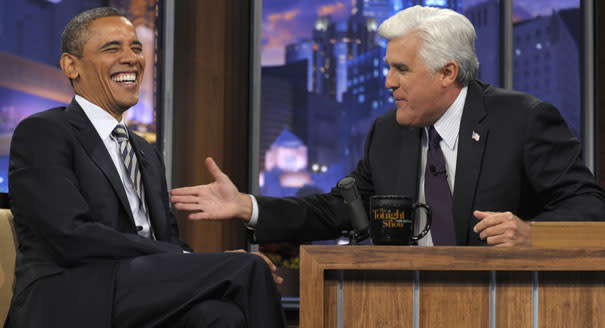 The Envoy
The EnvoyGadhafi’s dead, but White House war on “leading from behind” escalating

Moammar Gadhafi was buried in a secret location in the Libyan desert this week, bringing closure to Libyans' nine-month struggle to topple their dictator of 42 years.
Despite the victory celebrations in Benghazi over Gadhafi's demise, the Obama administration apparently is still bothered by a noteworthy phrase that has been used to describe President Barack Obama's chosen form of military intervention.
"Leading from behind" is how an anonymous Obama adviser, in an article by Ryan Lizza in the New Yorker in May, described the president's strategy to provide limited American military capabilities to NATO's air campaign to assist the Libyan rebels:
Nonetheless, Obama may be moving toward something resembling a doctrine. One of his advisers described the President's actions in Libya as "leading from behind." That's not a slogan designed for signs at the 2012 Democratic Convention, but it does accurately describe the balance that Obama now seems to be finding. It's a different definition of leadership than America is known for, and it comes from two unspoken beliefs: that the relative power of the U.S. is declining, as rivals like China rise, and that the U.S. is reviled in many parts of the world. Pursuing our interests and spreading our ideals thus requires stealth and modesty as well as military strength. "It's so at odds with the John Wayne expectation for what America is in the world," the adviser said. "But it's necessary for shepherding us through this phase."
In an appearance on the Jay Leno show this week, Obama denied ever using the phrase himself. "This was a phrase that the media picked up on," Obama told Leno. "But it's not one that I ever used."
And in an article by USA Today's David Jackson Thursday that was circulated by the White House to journalists under the subject line "in case you missed it," Tommy Vietor, a National Security Council spokesman, went further, denying that anyone from the Obama White House had ever said "leading from behind," to Lizza or anyone else.
"No one in this White House ever said leading from behind," Vietor told Jackson. "It wasn't even sourced to an administration official, but rather the more nebulous 'adviser.' There are hundreds of people who could credibly be called an 'adviser' to the President, and there are hundreds more who go to DC cocktail parties and claim to be one."
"I hope we can stop talking about a thinly sourced background quote and focus on the President's actual record of decisive leadership on foreign policy," Vietor added to Jackson.
Well, not yet.
Lizza took to Twitter Thursday to respond to Vietor's comment in USA Today. He said the "leading from behind" phrase was used by an official in the White House, (or "LFB" and "WH" in Twitter micro-blogging shorthand). "Couple of people have asked about this USAT piece," Lizza wrote. "Tommy V. is wrong. LFB quote is from WH official."
The fact is, anyone who works in an office knows that no agency official or office employee can reliably say what every other official at an agency did or did not tell someone on condition of anonymity.
And as the Washington Post's "fact-checker" Glenn Kessler notes Thursday, the "leading from behind" strategy was one the White House initially embraced as smart strategy--including in a Washington Post March front-page story entitled, "On Libya, Obama willing to let allies take the lead"--and only distanced itself from later after it became a target of mocking by some Republican opponents.
One thing is clear: if the White House's intent was to try to undermine the sourcing of the phrase, the strategy doesn't seem to have succeeded with this latest volley. Quite the opposite.
Other popular Yahoo! News stories:
• Army Ranger on 14th deployment killed in Afghanistan
• Iraq vet has fractured skull from 'police projectile' at Occupy Oakland: report
• John Huntsman talks to Yahoo News about the tea party, the polls--and his hair
• Shipwreck off Japan thought to be 13th century Kublai Khan "lost fleet"
Want more of our best national security stories? Visit The Envoy or connect with us on Facebook and on Twitter.
